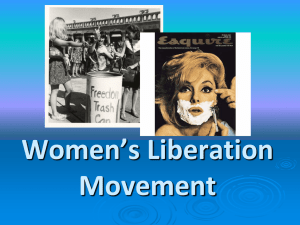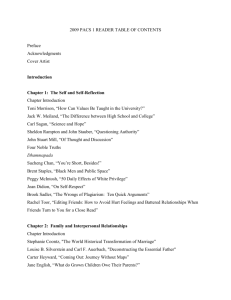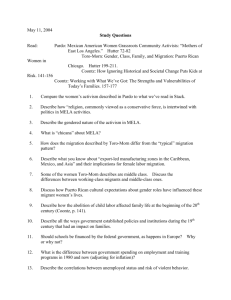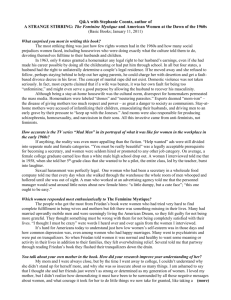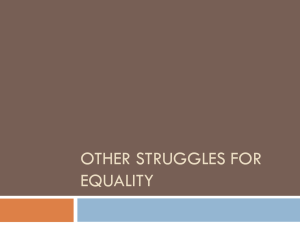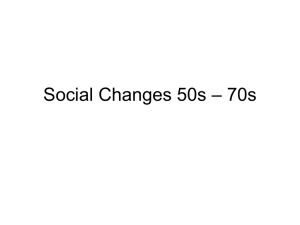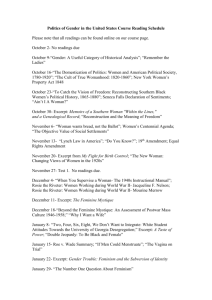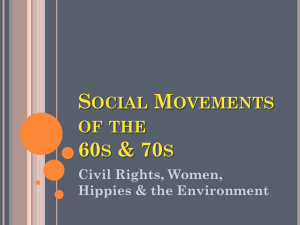Coontz Press Release
advertisement
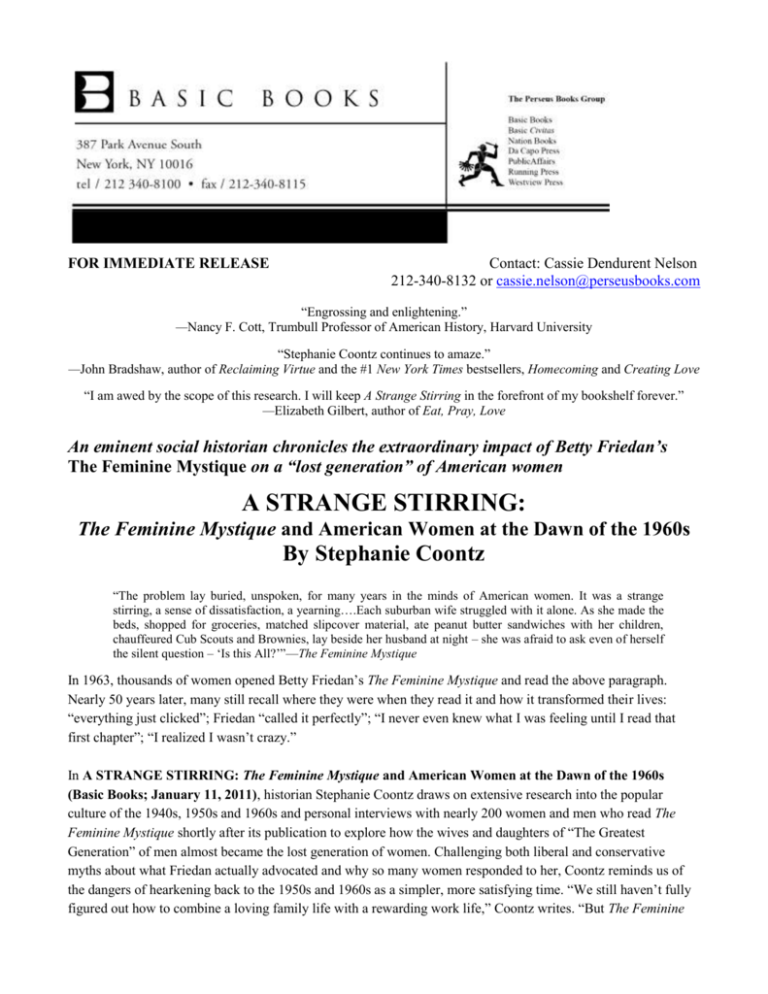
FOR IMMEDIATE RELEASE Contact: Cassie Dendurent Nelson 212-340-8132 or cassie.nelson@perseusbooks.com “Engrossing and enlightening.” —Nancy F. Cott, Trumbull Professor of American History, Harvard University “Stephanie Coontz continues to amaze.” —John Bradshaw, author of Reclaiming Virtue and the #1 New York Times bestsellers, Homecoming and Creating Love “I am awed by the scope of this research. I will keep A Strange Stirring in the forefront of my bookshelf forever.” —Elizabeth Gilbert, author of Eat, Pray, Love An eminent social historian chronicles the extraordinary impact of Betty Friedan’s The Feminine Mystique on a “lost generation” of American women A STRANGE STIRRING: The Feminine Mystique and American Women at the Dawn of the 1960s By Stephanie Coontz “The problem lay buried, unspoken, for many years in the minds of American women. It was a strange stirring, a sense of dissatisfaction, a yearning….Each suburban wife struggled with it alone. As she made the beds, shopped for groceries, matched slipcover material, ate peanut butter sandwiches with her children, chauffeured Cub Scouts and Brownies, lay beside her husband at night – she was afraid to ask even of herself the silent question – ‘Is this All?’”—The Feminine Mystique In 1963, thousands of women opened Betty Friedan’s The Feminine Mystique and read the above paragraph. Nearly 50 years later, many still recall where they were when they read it and how it transformed their lives: “everything just clicked”; Friedan “called it perfectly”; “I never even knew what I was feeling until I read that first chapter”; “I realized I wasn’t crazy.” In A STRANGE STIRRING: The Feminine Mystique and American Women at the Dawn of the 1960s (Basic Books; January 11, 2011), historian Stephanie Coontz draws on extensive research into the popular culture of the 1940s, 1950s and 1960s and personal interviews with nearly 200 women and men who read The Feminine Mystique shortly after its publication to explore how the wives and daughters of “The Greatest Generation” of men almost became the lost generation of women. Challenging both liberal and conservative myths about what Friedan actually advocated and why so many women responded to her, Coontz reminds us of the dangers of hearkening back to the 1950s and 1960s as a simpler, more satisfying time. “We still haven’t fully figured out how to combine a loving family life with a rewarding work life,” Coontz writes. “But The Feminine Mystique reminds us of the price women pay when we retreat from trying to resolve these dilemmas or fail to involve men in our attempts.” As Coontz explains, the advances of the suffrage movement and the new social freedoms of the roaring 1920s destroyed the old veneration of female purity and self-sacrificing motherhood without providing women with any new social respect as individuals. While men made enormous economic and political gains in the 1950s and 1960s, women remained legally and social subordinate. In 1963 husbands still retained legal control over almost every aspect of family life. Unmarried women couldn’t get credit in their own name, and gender-segregated helpwanted ads advertised for “pretty” gal Fridays. Freudian therapists insisted that normal women found complete fulfillment in homemaking, but popular culture blamed homemaker mothers for emasculating their husbands and infantilizing their sons. Coontz’s interviews paint a moving portrait of the pain, confusion, and self-doubt that these mixed messages created in women. Betty Friedan’s The Feminine Mystique was the first popular book to tell women it was not their fault that they felt trapped and discontented – that society was at fault for denigrating and wasting their capacities. Friedan’s insistence that an ordinary woman could be a person in her own right, in addition to being a wife and mother, came as a revelation to many women, Coontz notes. Coontz debunks the idea that Friedan was a man-hater, that The Feminine Mystique was anti-marriage, and that, by encouraging women to pursue higher education and devote themselves to their careers, feminism destabilized marriage and doomed many women to a life of loneliness. Yet she also counters many myths that Friedan herself promoted about the origins and consequences of the book. While conceding that Friedan addressed herself only to white, middle-class women, Coontz challenges the common view that African-American women would have loved to devote themselves to full-time homemaking. The real problem with Friedan’s neglect of black women, Coontz shows, was that she could have used them as an example of how women could combine their identities as wives, mothers, citizens, and workers. In her concluding chapter, Coontz summarizes what has changed for women, men, and families and what has not, arguing that although the old feminine mystique no longer prevails, new ones have taken its place. She also challenges media accounts that pit men against women and stay-at-home mothers against employed mothers. “Betty Friedan asked us to imagine a world where men and women can both find meaningful, socially useful work and also participate in the essential activities of love and caregiving for children, partners, parents, friends, and neighbors,” Coontz writes, and “that goal is even more relevant today.” ABOUT THE AUTHOR: Stephanie Coontz is the Director of Research and Public Education at the Council on Contemporary Families and teaches history and family studies at The Evergreen State College in Olympia, Washington. The author of Marriage: A History, The Way We Never Were, and The Way We Really Are, she has written about marriage and family issues in many national publications including the New York Times, Washington Post, Slate, and Psychology Today. She lives in Olympia, Washington. www.stephaniecoontz.com ABOUT THE BOOK: A STRANGE STIRRING: The Feminine Mystique and American Women at the Dawn of the 1960s By Stephanie Coontz Published by Basic Books Publication date: January 11, 2011 ISBN: 978-0-465-00200-9 • $25.95 / Hardcover • 248 pages For additional information about A STRANGE STIRRING and other Basic Books, visit us online at www.basicbooks.com, or follow us on Twitter at @BasicBooks. Advance praise for A STRANGE STIRRING: The Feminine Mystique and American Women at the Dawn of the 1960s By Stephanie Coontz (Basic Books; January 11, 2011) “In her latest work…Coontz focuses on a book we’ve come to take for granted, arguing that it deserves a closer look…. [S]he not only explores the actual content of The Feminine Mystique (going well beyond the usual proclamations about its controversiality and importance), but insists that readers (and, presumably, feminists) figure out how to reconcile our idealized version of history with information that complicates it.” —Bitch “As women continue to struggle with the effort to balance life and work, Coontz argues that The Feminine Mystique remains as relevant today as when it first appeared. In tracing the roots of current discontents, which Coontz dubs the ‘Supermom Mystique,’ her book is no less required reading than Friedan’s trailblazer.” —Booklist “Coontz recaptures the impact of Betty Friedan’s The Feminine Mystique when it was published in 1963. Although Friedan claimed credit for initiating the modern feminist movement, Coontz places the book more dispassionately in its historical context as one of many factors working against entrenched gender roles. Still, Coontz demonstrates persuasively that women readers from many backgrounds found relief—some called it life-saving—in knowing that they were not crazy and not alone in their need to find some work independent of their family roles.” —Library Journal “A sharp revisiting of the generation that was floored by Betty Friedan’s The Feminine Mystique (1963), and how the book is still relevant today…. A valuable education for women and men. —Kirkus Reviews “This perceptive [and] engrossing…book provides welcome context and background to a still controversial bestseller that changed how women viewed themselves.” —Publishers Weekly “Stephanie Coontz is not just one of the most important historians in America, she is also a personal hero of mine and a brilliant writer. This book—like all her books before it—has been a marvel and education for me to behold. I am awed by the scope of this research, of this thinking, and I am struck once more by how much there is learned (and taught) about the slow, stubborn advancement of women in America over the last one hundred years. I will keep A Strange Stirring in the forefront of my bookshelf forever.” —Elizabeth Gilbert, author of Eat, Pray, Love “This book offers a nuanced perspective on the women’s movement by ending the invisibility of AfricanAmerican women.” —Donna L. Franklin, author of Ensuring Inequality: The Structural Transformation of the African-American Family “Stephanie Coontz’s new book takes you on an engrossing and enlightening tour of the past, with wisdom and meaning for the future.” —Nancy F. Cott, Trumbull Professor of American History, Harvard University “Stephanie Coontz continues to amaze me. In her new book, A Strange Stirring, she chronicles the untold story of some of America’s greatest pioneers. This is a must read for all who care about our country’s growth and maturity. We owe the women described here the same gratitude and respect given to Lewis and Clark and the others who carved out this great nation.” —John Bradshaw, author of Reclaiming Virtue and the #1 New York Times bestsellers, Homecoming and Creating Love “It Changed My Life was the title of the book Betty Friedan wrote after her transformative 1963 The Feminine Mystique. And change she did the lives of American women. Now in her biography of a classic, Stephanie Coontz imaginatively explores the impact of Friedan’s book. Weaving a rich fabric from what women said in letters and interviews, from articles in popular magazines, current scholarship, and her own astute reading of the 1963 work, Coontz compellingly reveals how generations of women—from the flappers of the 1920s to the bloggers and helicopter moms of today—have responded to the challenges modern women face.” —Daniel Horowitz, author of Betty Friedan and the Making of The Feminine Mystique “As was written about The Feminine Mystique, A Strange Stirring is ‘a journalistic tour de force, combining scholarship, investigative reporting and a compelling personal voice.’ Stephanie Coontz has made a significant contribution to our understanding of the most transformative movement of our lifetimes. Much of what Coontz reports regarding the prevailing ethos of the 1950s as a time of conformity, cultural conservatism and social repressiveness will be fascinating and eye-opening for younger readers. This book is a must read for men as well as for women. And the transformational desire for a work/family balance in life is now reflected not just by gender, but by generation, as both men and women ‘need to grow and fulfill their potentialities as human beings,’ as Friedan wrote almost a half a century ago.” —Christie Hefner, former chairman and chief executive officer of Playboy Enterprises and longest serving female C.E.O. of a U.S. public company # # #
